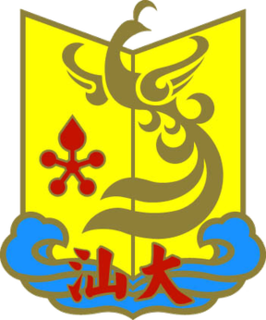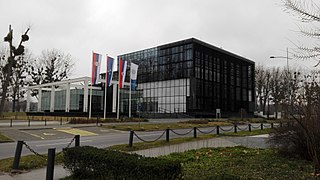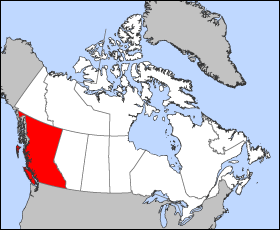
Shantou University, a key comprehensive university under the provincial Project 211 program in Guangdong, was founded in 1981 with the approval of the State Council. It is the only public university that receives funding from the Li Ka Shing Foundation. It is also supported by the Ministry of Education (MOE), the Guangdong Provincial Government and the Li Ka Shing Foundation. STU is located in Shantou, a city in South China.

Radio Amateurs of Canada (RAC), known in French as Radio Amateurs du Canada, is the national association for Amateur Radio in Canada. It is a not-for-profit membership association with headquarters in Ottawa, Ontario, Canada, representing the interests of Amateur Radio all across Canada. Speaking on behalf of Canadian Radio Amateurs, RAC provides liaison with government agencies and carries the Amateur voice about regulatory and spectrum issues to the discussion table with government and industry leaders, nationally and internationally.

Universities Canada is an organization that represents Canada's colleges and universities. It is a non profit national organization that coordinates university policies, guidance, and direction.

New Brunswick Community College (NBCC) is a community college located throughout various locations in New Brunswick, Canada including Moncton, Miramichi, Fredericton, Saint John, St. Andrews, and Woodstock.

The TEMPUS program encourages higher education institutions in the EU Member States and partner countries to engage in structured cooperation through the establishment of "consortia". The "consortia" implement Joint European Projects (JEPs) with a clear set of objectives. Such projects may receive financial aid for two or three years. Tempus also provides Individual Mobility Grants (IMGs) to individuals working in Higher Education sector to help them work on certain specified activities in other countries.
International education refers to a dynamic concept that involves a journey or movement of people, minds, or ideas across political and cultural frontiers. It is facilitated by the globalization phenomenon, which increasingly erases the constraints of geography on economic, social and cultural arrangements. The concept involves a broad range of learning, covering, for instance, formal education and informal learning. It could also involve a reorientation of academic outlook such as the pursuit of "worldmindedness" as a goal so that a school or its academic focus is considered international. For example, the National Association of State Universities prescribes the adoption of "proper education" that reflects the full range of international, social, political, cultural, and economic dialogue. International educators are responsible for "designing, managing, and facilitating programs and activities that help participants to appropriately, effectively, and ethically engage in interactions with culturally diverse people and ideas."

The University of Novi Sad is a public university in Novi Sad, Serbia. Alongside nationally prestigious University of Belgrade, University of Novi Sad is one of the most important educational and research institutions in Serbia and South Eastern Europe and the flagship institution of higher education in Vojvodina. It was attended by 42,489 students and it employed 3,219 members of academic staff in 2018–19 academic year. It is composed of 14 faculties and three institutes located in four university cities - Novi Sad, Sombor, Subotica and Zrenjanin. Institution belongs to the group of comprehensive research universities with significant level of research activities.
Science, technology, engineering, and mathematics (STEM) is a broad term used to group together these academic disciplines. This term is typically used to address an education policy or curriculum choices in schools. It has implications for workforce development, national security concerns and immigration policy.

Tertiary education in Australia is formal education beyond high school, consisting of both government and private institutions and divided into two sectors; vocational education and training and higher education. 69% of Australians aged 20–64 have a non-school qualification, and 24% have multiple qualifications.
Association of Colleges and Universities of the Canadian Francophonie promotes community college and university education in minority francophone communities in Canada, through cooperation between its member institutions. In the community it serves, each member institution plays a crucial role in cultural, social and economic development. The Association represents its member institutions on topics of mutual interest before the Government of Canada, national and international organizations. Up until 1 April 2015, the organisation was known as the Association of Universities of the Canadian Francophonie, or in French, Association des universités de la francophonie canadienne (AUFC), when it did not include community college members.

Education in Azerbaijan is regulated by the Ministry of Education of Azerbaijan.

Higher education in British Columbia is delivered by 25 publicly funded institutions that are composed of eleven universities, eleven colleges, and three institutes. This is in addition to three private universities, five private colleges, and six theological colleges. There are also an extensive number of private career institutes and colleges.

Professor Janaka Ruwanpura is the Vice Provost and Associate Vice-President Research (International) of the University of Calgary, Canada effective Sept. 1, 2020. He has been the Vice-Provost International since 2013.
The Classic Private University is a university in Ukraine.
The Conference of the Americas on International Education (CAIE) is an international conference that takes place once every 18 months within the Americas. It is organized by the Inter-American Organization for Higher Education, which has its headquarters in Montreal, Canada, and the CAIE General Secretariat is located there.
Shanghai Polytechnic University is a public university in Shanghai. It was founded in 1960.
Internationalization of higher education in theory is "the process of integrating an international, intercultural, or global dimension into the purpose, functions or delivery of postsecondary education." Internationalization of higher education in practice is "the process of commercializing research and postsecondary education, and international competition for the recruitment of foreign students from wealthy and privileged countries in order to generate revenue, secure national profile, and build international reputation." The main components of internationalization of higher education are recruitment of international students, development of international branch campuses, students, staff and scholars exchange programs, internationalization of the curriculum, and research and education partnerships between institutions regionally and internationally.
Open educational resources in Canada are the various initiatives related to open education, open educational resources (OER), open pedagogies (OEP), open educational practices (OEP), and open scholarship that are established nationally and provincially across Canadian K-12 and higher education sectors, and where Canadian based inititatives extend to international collaborations.
International student services are the services, supports and programming available to undergraduate and graduate international students provided by the institution at which they are studying. These services have been developed to meet international students' specific needs during their post-secondary studies and can include: orientation programming, immigration advising, academic and language support, financial aid support, employment services, health and wellness support, residence and housing support, social programming, and post-graduation planning support.
Canada attracts a significant number of international students at all levels of the Canadian education system. As of 2019, it is the fourth most popular country for international student enrollment, behind the United States, United Kingdom, and China.










